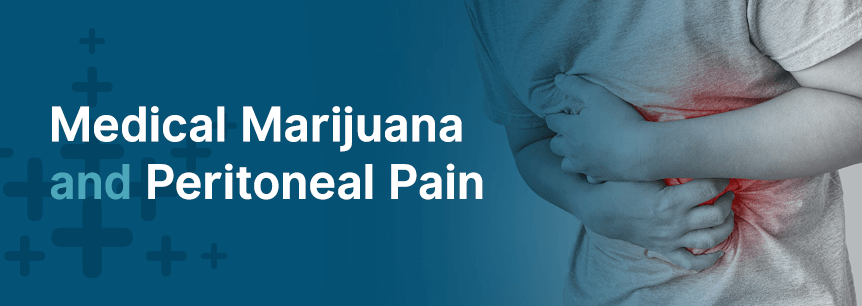
Peritoneal pain, or severe abdominal pain, primarily stems from peritonitis. If you’re suffering from peritoneal pain, you’ve likely tried many types of pain relievers and other treatments for its symptoms. Luckily, cannabis is well-known for its pain-relieving properties, and you might find good results with medical marijuana and peritoneal pain treatment.
Peritoneal pain is commonly caused by peritonitis, or inflammation of the peritoneum, the tissue lining your abdominal inner wall. It supports and covers most of the organs in your abdomen. Usually, fungi or bacteria is what causes peritonitis.
If you don’t have peritonitis treated, it can cause sepsis quickly by spreading into your blood and other organs. This can lead to multiple organ failure and even death. Therefore, if you’re experiencing severe abdominal pain or other peritonitis symptoms, you need to seek immediate medical attention and receive treatment before it leads to potentially fatal complications.
Certain conditions may lead to peritonitis, including:
You can also develop this type of severe abdominal pain as a result of having peritoneal cancer or peritoneal dialysis.
Peritonitis symptoms are serious and require immediate medical attention either by an ambulance callout or going to the nearest emergency room. Individuals who develop the condition while they’re in a hospital require urgent attention.
The primary symptom of peritonitis is peritoneal pain or severe stomach pain that continues to get worse. Other symptoms you may experience are:
Seek medical help if you experience any of these symptoms whether or not they’re related to peritonitis.
The two primary types of peritonitis leading to abdominal pain are:
Both of these types are life-threatening. Many factors determine peritonitis’s death rate, but it could get as high as 40 percent in individuals with cirrhosis. Up to 10 percent of individuals could die from secondary peritonitis.
Common primary spontaneous peritonitis risk factors include:
Common secondary peritonitis risk factors include:
Non-infectious causes are irritants like blood, bile or foreign abdominal substances.
Because peritoneal pain is often caused by an infection, if you don’t receive proper treatment, the effects may be fatal. Potential spontaneous peritonitis complications include:
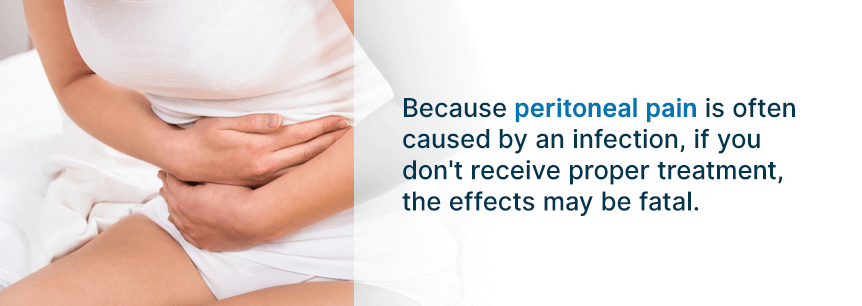
Secondary peritonitis complications include:
Chronic pain often causes depression in people and treatment is necessary to improve the quality of life and outcome measures. Also, mood disorders like anxiety and depression may exacerbate pain perception.
According to the National Institutes of Health, statistics involving peritoneal pain include:
The overall peritonitis incidence in the U.S. during the 1980s and earlier 1990s in continuous ambulatory peritoneal dialysis patients averaged around 1.1 to 1.3 episodes for each patient-year of treatment.
During 1994 through 2003, the peritonitis incidence in Hong Kong decreased from 1.10 episodes per year to 0.46 episodes per year. Right after the year 2000, various centers have been reporting a 0.2 to 0.6 peritonitis episode rate per year of treatment — around one episode in 20 to 60 patient-months.
Prevention is the best treatment. Often, germs around the catheter cause peritoneal dialysis-related peritonitis. There are certain measures you can take if you’re receiving peritoneal dialysis to prevent peritonitis. These are:
If you’re experiencing peritoneal pain and other peritonitis symptoms, seek medical help immediately. Don’t hesitate since it could threaten your life.
Some options for treatment are as follows:
Your doctor may order an intravenous (IV) course of antibiotics. They’ll likely start you off on general purpose antibiotics as they wait for your test results to come back identifying the bacteria. They’ll administer more specific antibiotics once they have that answer or if general antibiotics aren’t working.
Side effects of antibiotics are:
Your physician may recommend surgery depending on the cause of your peritonitis, such as if you have a hole in your gut. They may need to operate to remove damaged peritoneal tissue. Any surgery comes with risks, and complications such as infection, excessive scarring or hemorrhaging could arise. You may have additional risks if you undergo general anesthesia, including pneumonia, blood clots or kidney failure. Certain existing health conditions can increase your chances of experiencing complications.
Your doctor may consider wider support therapies ranging from dietary assistance to intensive life support.
Quite a few clinical trials are being conducted for peritonitis, including:
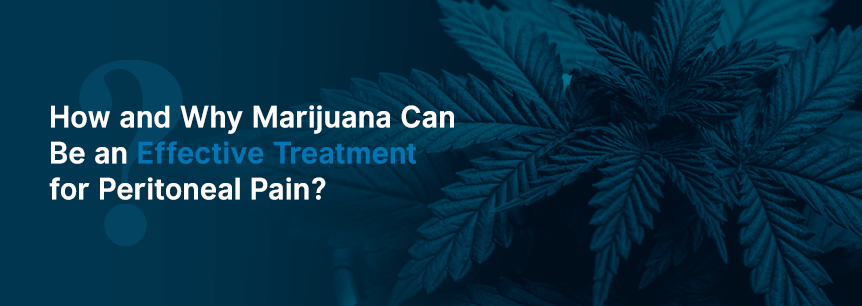
While peritoneal pain is often the primary symptom of a serious infection, it can have other, less serious causes, or can persist after the infection has been treated. If your doctor treats you for an infection, but you still have pain while you wait for the antibiotics to do their job, medical cannabis can help treat the lingering pain.
The Journal of the American Medical Association published a Harvard review of 28 random trials of cannabinoids to treat pain which revealed that marijuana’s use for chronic pain is backed by quality evidence.
Additionally, a study published in the Journal of Pain from the University of Michigan showed that marijuana treatment caused:
Some symptoms of peritoneal pain that cannabis is effective at treating are:
Severe and chronic nausea can result in poor quality of life. For decades, researchers have been studying cannabinoids’ effects on nausea. One small but conclusive study done in 1975 showed specific types of THC can relieve nausea. Chemotherapy patients were given placebo or THC over several chemo courses. All 20 participants found nausea relief during a majority of the courses when they used specific types of THC, compared to no relief during any of the placebo courses. Researchers also found that CBD has antiemetic potential, meaning it may also be effective against vomiting and nausea.
Depression affects people deeply and can cause many problems for the individual, both physical and emotional, as well as for their loved ones. Depression can impact how you deal with work, school or other things in your daily life. It can also impact your relationships. Those with depression have been using marijuana to treat their symptoms since it heightens the mood and provides energy.
Cannabis can act as a replacement for anti-anxiety medicine in some people. Research shows the herb has similar components for anxiety symptoms as manufactured pharmaceuticals.
Opioid narcotics, like Percocet and Vicodin, are commonly used for treating serious pain. Many patients also use analgesics, such as acetaminophen and ibuprofen. However, narcotics and opiates, while effective at relieving pain, are extremely addictive and come with harsh side effects.
Although analgesics aren’t addictive, they’re also not as effective at reducing or eliminating pain. Analgesics may also cause liver damage, stomach bleeding and kidney damage when used long-term.
Medical cannabis for peritoneal pain is effective and safer as a treatment than opioids. Individuals struggling with pain find strong improvement in their symptoms, regardless of whether they smoke or eat the herb or use an oral spray. Since there are a high number of individuals dying from an opioid overdose, medical weed is becoming a more popular substitute for addressing pain.
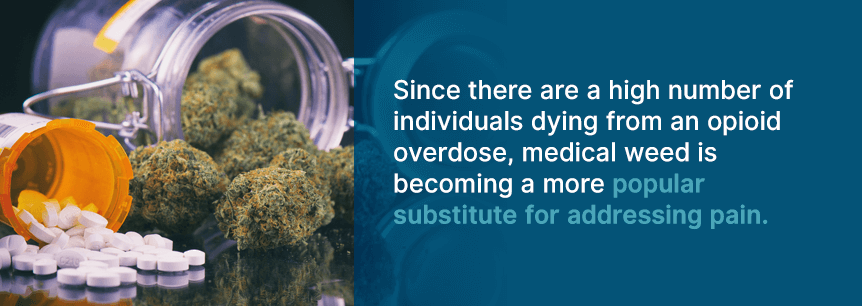
No two marijuana strains work the same. And, unless weed is grown in an extremely monitored and controlled environment, things like wind, air quality, and sun exposure may alter a growing plant’s potency.
There are three primary strain types — sativa, indica, and hybrid. Each has its specific strengths so they are helpful for treating a variety of conditions, including peritoneal pain and its co-occurring symptoms such as nausea, depression, and anxiety. Within those three types are individual strains.
Some recommended medical cannabis strains for peritoneal pain are:
You can work with the budtender at cannabis dispensary to help choose the best strain for you. You may need to try more than one strain to find optimal relief from your peritoneal pain.
Along with choosing the right strain, you’ll also want to determine the best method of using it. Each method creates a different effect and you’ll need to experiment a little to find which method or methods work best for your symptoms.
Here are a few of the most common methods:
Consider how your symptoms occur and the needs of your body to find the best method of delivery. Talk with dispensary staff or your doctor for advice. They will point you in the best direction of how each method will affect you, and which method would be best for peritoneal pain.
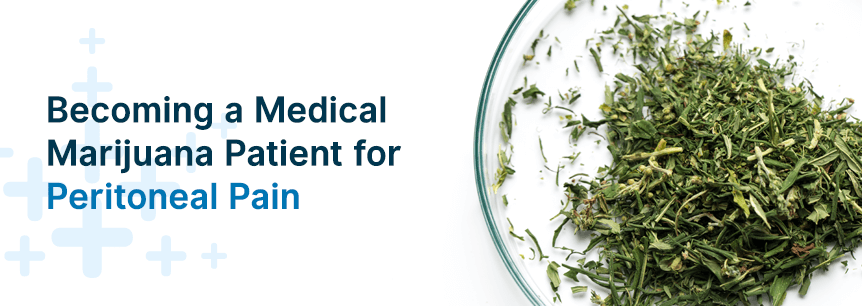
After reading this in-depth guide on marijuana for peritoneal pain, if you would like to give medical marijuana a try or if you need more information, utilize the expansive resources here at MarijuanaDoctors.com. We’ll provide you with all the necessary information you need to decide if cannabis is indeed a good treatment option for you.
An important part of starting your marijuana and peritoneal pain treatment is finding a qualified cannabis doctor and a medical marijuana dispensary. The good news is we provide you with both of these through our comprehensive list. You can browse our list and set up your appointment to consult with one of our cannabis doctors.
Physicians found through MarijuanaDoctors.com are thoroughly screened and licensed. They have knowledge and experience in dealing with medical marijuana and have helped many patients in the past. All it takes is a couple of clicks of your mouse to find a reputable cannabis doctor.
You don’t have to struggle with peritoneal pain or other horrible symptoms of peritonitis. We are your one-stop resource to finally finding the relief you need so you can return to a better quality of life.
Find A Doctor Find A Dispensary